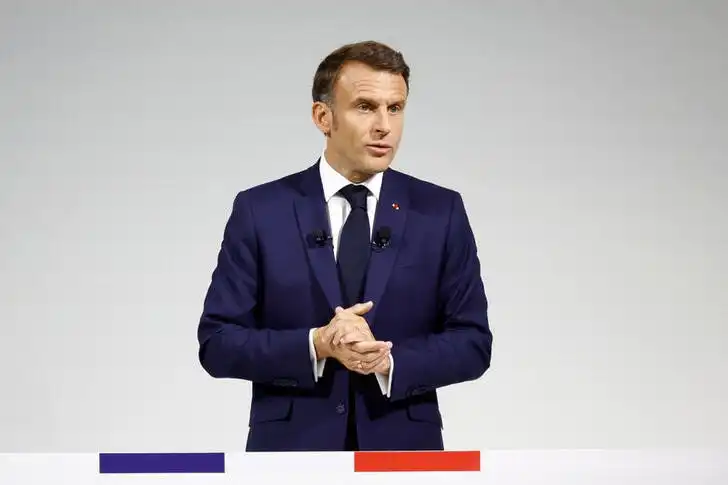French President Emmanuel Macron stated on Monday (24) that Europe is ready to provide security guarantees to Ukraine, reinforcing the continent’s commitment to support the country amid Russia’s ongoing aggression. The statement was made during a meeting at the White House with U.S. President Donald Trump, marking a significant moment in diplomatic discussions on the conflict in Eastern Europe.
The meeting between Macron and Trump took place in the Oval Office after a video conference with the other G7 leaders — a group composed of Canada, France, Germany, Italy, Japan, the United Kingdom, and the United States — where the next steps to try to end the war, which marks its third anniversary on Monday, were debated. During the meeting, the leaders discussed crucial issues, such as the provision of humanitarian aid to Ukraine, the economic impact of the conflict on Europe, and long-term strategies to ensure regional stability.

Macron, the first European leader to visit Trump since the beginning of his second term, emphasized the urgent need to negotiate a ceasefire between Russia and Ukraine before any permanent peace agreement. According to the French president, the ceasefire would be the essential first step to creating an environment conducive to peace negotiations, which would need to be supported by concrete security guarantees for Ukraine. “Europe has a crucial role in this process. We cannot allow Ukraine to remain vulnerable after the conflict ends,” Macron stated.
In addition to the ceasefire, Macron suggested creating an international monitoring mechanism to ensure compliance with ceasefire agreements. He also proposed involving multilateral organizations, such as the UN and the OSCE (Organization for Security and Cooperation in Europe), to oversee the process and ensure that all parties respect the terms of the agreement.
The conflict began in February 2022 when Russia launched a large-scale invasion of Ukrainian territory from three distinct fronts: directly from the Russian border, through Crimea — annexed by Russia in 2014 — and via Belarus, a strategic ally of the Kremlin. In the early days of the offensive, Russian forces made significant advances, even threatening the capital, Kyiv. However, Ukrainian resistance, supported by weapons supplied by Western countries, managed to repel some of the invading forces and maintain control over the capital.
Since then, the war has dragged on, causing thousands of deaths and mass displacements, as well as triggering a series of stringent economic sanctions by the West against Moscow. The sanctions affected key sectors of the Russian economy, such as energy, finance, and technology, leading to a significant recession in the country. However, Russia managed to maintain part of its military capacity and continued its offensives in several regions of Ukraine.
In October 2024, the conflict entered an even more dangerous phase, with analysts warning of the increased risk of military escalation. Tension reached new heights when Russian President Vladimir Putin authorized the use of an intermediate-range hypersonic missile in an attack on Ukrainian territory. Although the projectile was equipped with conventional warheads, experts pointed out that this type of weapon has the capacity to carry nuclear payloads, raising international alert levels.
This attack occurred in response to a Ukrainian offensive within Russian territory, using advanced weapons supplied by Western powers, such as the United States, the United Kingdom, and France. The escalation of violence also brought new worrying reports: according to Western intelligence sources, Russia was using North Korean troops in the conflict, although both Moscow and Pyongyang have neither confirmed nor denied these allegations.
The war scenario has also undergone internal political changes in Russia. In May, Putin replaced his defense minister, citing the need for a more effective strategy. Since then, Russian forces have reportedly made advances on various fronts, according to Kremlin statements. “Russia will achieve all its objectives in Ukraine,” Putin said, without providing specific details.
On the other hand, Ukrainian President Volodymyr Zelensky remains firm in his opposition to Russian occupation and accuses Moscow of intensifying its efforts to take the entire Donbass region — which includes the Donetsk and Luhansk provinces — and attempting to expel Ukrainian forces from the Kursk region, within Russian territory, where Ukrainian troops have held positions since August.
Zelensky also highlighted the need for greater international support to strengthen Ukraine’s defenses and alleviate the humanitarian crisis in the country. He appealed for more shipments of sophisticated weapons and an increase in sanctions against Russia, as well as requesting financial assistance to rebuild the war-torn areas.
In this complex scenario, Macron’s statements about security guarantees become even more relevant. The French leader emphasized that any lasting peace agreement would need to include mechanisms that ensure Ukraine’s territorial integrity and prevent future aggression. He also stressed the importance of European unity and transatlantic cooperation in this process, stating that peace will only be achieved through a joint and coordinated effort.
Macron also suggested the possibility of establishing a specific international treaty for Ukraine’s security, which would have the military and economic support of several European nations and Western allies. This treaty would aim to create a protection network that discourages future aggression and guarantees the country’s sovereignty.
The meeting between Macron and Trump represents an important step in aligning Western strategies regarding the conflict and strengthening diplomatic initiatives in search of a peaceful and sustainable solution to the war in Ukraine. Both leaders agreed to maintain open communication channels with all parties involved and continue pressing for a negotiated resolution that respects international law and the principles of national sovereignty.
As the conflict enters its fourth year, the international community faces the challenge of finding a path to peace while dealing with the humanitarian, economic, and political consequences of this devastating war.

